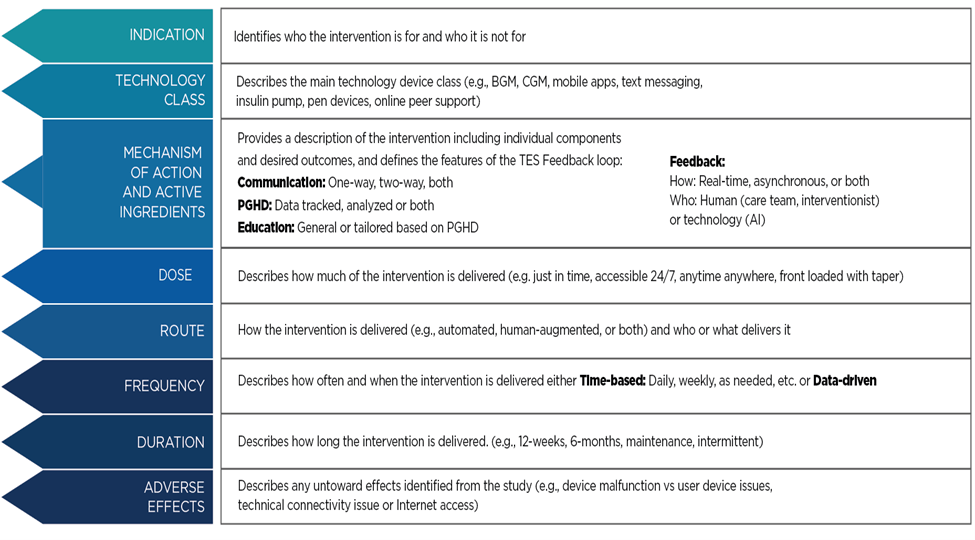Employing a New Taxonomy for Technology-Enabled Care
Aug 26, 2021, 08:54 AM
By Deborah Greenwood, PhD, RN, BC-ADM, CDCES, FACDES
Technology-enabled tools are evolving and advancing. Evidence continues to support the use of these kinds of interventions to enable personalized diabetes self-management education and support (DSMES) services. Through increased expansion and out of the box thinking, technology-enabled tools can positively impact outcomes for chronic conditions. But how? Where is the evidence?
In 2017, in conjunction with ADCES, I participated in a review that defined the technology-enabled self-management (TES) feedback loop and the key elements associated with a reduction in A1C. Elements include two-way communication, use of patient generated health data, tailored education and individualized feedback. However, after our initial literature review, we realized that these elements were not always clearly described. This made it challenging to understand why and how the interventions were achieving positive outcomes.
In 2021, again with ADCES, I worked with a team of researchers to define the elements that were associated with a reduction in A1C. Through an umbrella review—a systematic review of systematic reviews— we identified the key attributes that help to define the “active ingredients” of TES interventions.
We are now very excited to share our findings in a new study from The Journal of Diabetes Science and Technology - A New Taxonomy for Technology-Enabled Diabetes Self-Management Interventions: Results of an Umbrella Review. This article is featured as part of a special issue on diabetes and digital health.
In this paper, we describe the TES taxonomy, modeled after the medication full prescribing information (FPI). It includes the following attributes: indications, class, mechanism of action, active ingredients, dose, route, frequency, duration and adverse effects. This standardizes the description of technology-enabled interventions as well as helps to ensure future research applies the taxonomy to allow for evaluation and replication.
Taxonomy of Technology-Enabled Self-Management Interventions

For diabetes care and education specialists, the TES taxonomy can guide them to critically appraise technology-enabled and digital health tools. DSMES services that integrate the TES feedback loop will be able to individualize and personalize care by incorporating patient generated health data to engage people with diabetes to the fullest capacity.
As we look to the future, we know that these data can inform our specialty. Data from the 2017 review were incorporated into the National Standards for Diabetes Self-Management, Education and Support as well as the American Diabetes Association Standards of Care since 2017. It is my hope that this 2021 updated review will continue to support the National Standards revision and provide further evidence to guide clinicians and researchers in the future, specifically when designing, implementing and evaluating technology-enabled DSMES services.
For additional information on technology-enabled care, visit DiabetesEducator.org/TechnologyIntegration.
A special thank you to the full writing team:
- Deborah A. Greenwood, PhD, RN, BC-ADM, CDCES
- Michelle L. Litchman, PhD, FNP-BC, FAANP
- Diana Isaacs, PharmD, BCPS, BCACP, CDCES, BC-ADM
- Julia E. Blanchette, PhD, RN, CDCES
- Jane K. Dickinson, RN, PhD, CDCES
- Allyson Hughes
- Vanessa D. Colicchio, BSN, RN
- Jiancheng Ye, MS
- Kirsten Yehl, MS, MLIS,
- Andrew Todd, MLIS, BSN,
- Malinda M. Peeples, MS, RN, CDCES
ADCES Perspectives on Diabetes Care
The Association of Diabetes Care & Education Specialists Perspectives on Diabetes Care covers diabetes, prediabetes and other cardiometabolic conditions. Not all views expressed reflect the official position of the Association of Diabetes Care & Education Specialists.
Copyright is owned or held by the Association of Diabetes Care & Education Specialists and all rights are reserved. Permission is granted, at no cost and without need for further request, to link to, quote, excerpt or reprint from these stories in any medium as long as no text is altered, and proper attribution is made to the Association of Diabetes Care & Education Specialists.
HEALTHCARE DISCLAIMER: This site and its services do not constitute the practice of medical advice, diagnosis or treatment. Always talk to your diabetes care and education specialist or healthcare provider for diagnosis and treatment, including your specific medical needs. If you have or suspect that you have a medical problem or condition, please contact a qualified health care professional immediately. To find a diabetes care and education specialist near you, visit DiabetesEducator.org/Find.